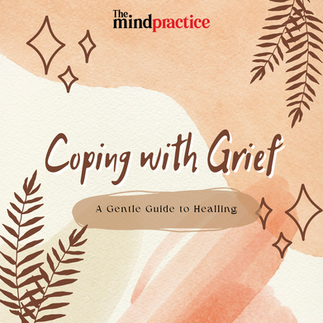Coping with Grief: A Gentle Guide to Healing - Grief is one of the most profound human experiences. Losing a loved one changes us in ways we never imagined. It can feel like the ground beneath us has disappeared, leaving us disoriented, lost, and overwhelmed. While grief never truly ends, healing is possible.
If you are grieving, this guide is here to help you navigate the waves of loss with compassion and understanding.
Understanding Grief: A Lifelong Journey
Grief is not something we get over; it is something we learn to carry. Some days, the weight feels unbearable; other days, it feels lighter. But no matter how long it has been, missing someone you love is natural.
Healing does not mean forgetting. It means integrating the loss into your life in a way that allows you to move forward while still honoring your loved one’s memory.
Be patient with yourself. There is no timeline for grief.
Common Feelings After Loss
Grief manifests in different ways, and no two people experience it the same. Some common emotions include:
Sadness or emptiness – A deep sense of longing or feeling incomplete
Anger or frustration – At life, at circumstances, at the unfairness of it all
Guilt or regret – Thoughts like "I should have said more" or "I wish I had spent more time with them"
Numbness or detachment – Feeling disconnected from the world or like nothing makes sense anymore
Anxiety or fear – Worrying about the future without them, feeling unsafe or vulnerable
These feelings may come in waves—sometimes gentle, sometimes overwhelming. Whatever you are feeling is valid.
How to Cope with Grief
While grief cannot be fixed, there are ways to navigate the pain with kindness toward yourself.
1. Allow Yourself to Feel
Grief is painful, and it is natural to want to push it away. But suppressing emotions only makes them stronger. Let yourself cry, express your sadness, and acknowledge your pain.
Give yourself permission to grieve in your own way and at your own pace.
2. Take Small Steps Toward Healing
Grief can be exhausting, making even the simplest tasks feel overwhelming. Start with small, gentle actions:
Spend time in nature
Practice mindfulness or deep breathing
Write in a journal
Listen to comforting music
Engage in light physical activity, such as stretching or walking
You do not have to do everything at once. Start with one small step.
3. Find Comfort in Memories
At first, memories might feel painful, but over time, they can become a source of comfort.
Look through old photos or videos
Write a letter to your loved one
Create something meaningful—a scrapbook, a painting, or a playlist
Honouring their memory in a way that feels right to you can be deeply healing.
4. Lean on Your Support System
You do not have to go through grief alone. Reach out to trusted friends, family members, or a grief support group. Talking about your feelings can help lighten the burden.
If your grief feels overwhelming, seeking professional support can be life-changing. Therapy provides a safe space to process emotions, find coping strategies, and navigate your unique grief journey.
5. Be Gentle with Yourself
Grief is exhausting, and healing takes time. Some days, you may feel okay, while other days, the pain may feel just as raw as the day you lost them. That is normal.
Some days, getting out of bed is an accomplishment. Some days, smiling feels impossible. Wherever you are, be kind to yourself.
When Grief Feels Overwhelming
Sometimes, grief can feel all-consuming. If you are struggling to function in daily life, it may be helpful to seek professional help. Signs that you may need extra support include:
Persistent sadness that does not ease over time
Withdrawing from loved ones or avoiding daily activities
Feeling numb or disconnected from the world
Intense guilt, regret, or anger
Thoughts of self-harm or hopelessness
If grief feels too heavy to carry alone, reach out. There is no shame in asking for help.
Healing Does Not Mean Forgetting
Losing someone changes us. We do not move on from loss; we move forward with it. The love we shared remains, shaping us into who we are.
As time passes, grief does not disappear, but it becomes a part of our story, woven into our lives in a way that allows us to remember, love, and live.
If you are grieving, be gentle with yourself. Healing happens in its own time, in its own way. And no matter what, you are not alone.
If you are currently grieving, know that it is okay to take your time. Healing is not linear, and there is no right or wrong way to grieve.
For more insights and resources, follow us on Instagram (@TheMindPractice) and stay connected for more mental health discussions. Visit www.themindpractice.in for more such articles.













Comments